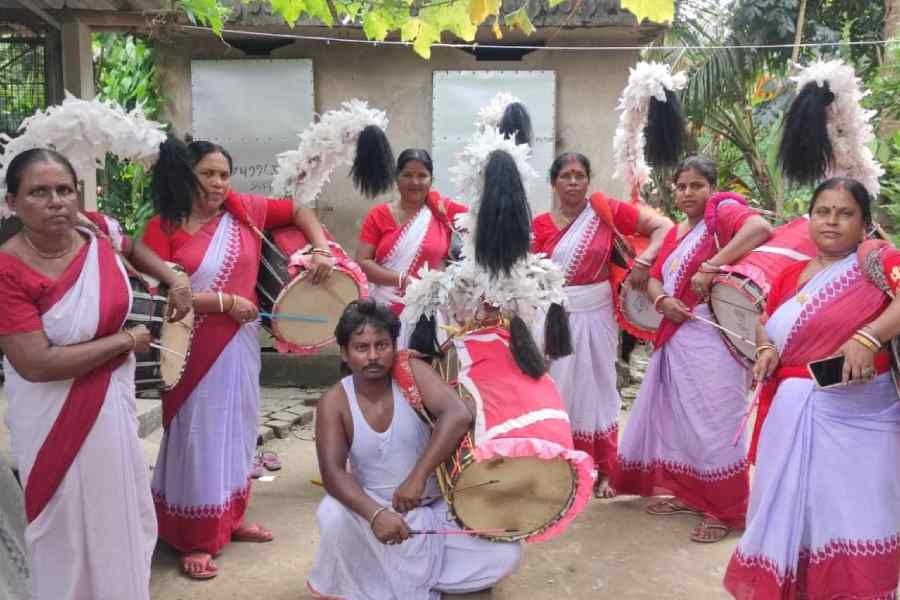Sundara Das, 28, works as a farm labourer round the year but takes a break during Durga Puja to join a band of women dhakis (traditional drummers) who travel outside their villages to perform for a “good” fee.
Sundara and her drummer peers look forward to the Puja to make a decent amount of money in one go.
However, the RG Kar rape and murder and the subsequent protests have cast a shadow on their hopes as they still wait to be hired by organisers even though Puja is a few weeks away.
“I save the money I earn during Puja for my children’s future education. They are in primary school now. The money also serves as an emergency fund for my family. I’m not sure if we’ll get hired this year,” Sundara said.
“We have already reached out to around half a dozen Puja committees where we have performed earlier. Each of them refused to hire us, saying they would organise a low-profile puja because of the RG Kar incident,” said 40-year-old Alpana Das, a member of Baba Gururaj Dhaki Sampradai — a group of women dhakis — from Madhupur village in East Burdwan’s Purbasthali.
She said she had already reached out to Puja committees in Calcutta, Hooghly and Nadia. “Even today, we rehearsed with the hope that we will get hired,” Alpana said.
The all-woman band of dhakis, of which Alpana and Sundara are members, has been performing for the past 10 years at pandals across Bengal. The group has 10 members aged between 28 and 40 years who come from families of marginal farmers and farm labourers.
The amount they earn as dhakis is significantly more than the ₹300 per day that someone like Sundara makes for hours of toil in the field.
According to a band member, missing a Puja means sacrificing a substantial part of their annual income. Last year, the band of women drummers from Purbasthali was hired by a Puja organiser in Nadia’s Kalyani for ₹2 lakh.
“We each earn around ₹18,000 for performing for four to five days. It’s a huge amount for me. I use the money to pay for my two children’s education. They are in high school,” said Alpana, who leads the team.
Sanyasi Das, a dhaki from Madhupur village, was the first person in East Burdwan’s Purbasthali to form a band of women dhakis about10 years ago.
“As the demand for all-woman dhaki bands increased, I suggested that women of our area form a group,” said Sanyasi, who also trained the women.
Currently, there are dozens of dhaki bands — of both men and women — in several districts of south Bengal.
Dhakis who perform at Puja pandals in Calcutta and its suburban areas usually come from Birbhum, East Burdwan, Hooghly, Bankura and Murshidabad.
In the wake of the RG Kar brutality, many Puja committees across Bengal have decided to limit their celebrations to traditional rituals.
“There is no festive mood in our area. So we have decided to organise a simple, low-profile puja without any celebrations,” said Tapati Mukherjee, president of Mahila Milan Chakra in Serampore’s Naoga. The committee is among many that have refused the state government’s Puja grant of ₹85,000 to protest against the RG Kar rape and murder of the junior doctor.
Though the women dhakis are often hired individually for local programmes or minor religious events, the organisers book the entire group during Durga and Kali Puja.
“Kali Puja assignments are not frequent, but Durga Puja is a surety. Losing out on that earning will hit us hard,” said Sundara. “I have already lost two years’ income during Covid-19.”
However, individual dhakis are not as severely affected as dhak is an essential component of DurgaPuja rituals.
“This time, I’ve been hired by a Puja committee in south Calcutta. One of the organisers told me there would be no special programmes like the dhunuchi nach,” said Sashthi Das, a dhaki from Birbhum’s Nanoor.











